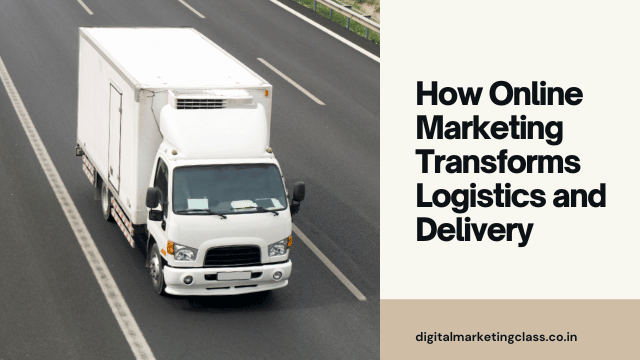The intersection of online marketing and logistics and delivery has significantly transformed both fields, creating a symbiotic relationship that has reshaped consumer expectations, business models, and the global marketplace. Here we will discuss about the ways in which online marketing has influenced logistics and delivery, highlighting the advent of new technologies, the evolution of consumer behavior, and the strategic responses by companies to these changes.
The Catalyst of Change: Online Marketing
Table of Contents
Online marketing, with its vast reach and precision targeting capabilities, has fundamentally altered how businesses connect with consumers. Through SEO, social media, email campaigns, and other digital strategies, companies can engage with a broader audience more effectively and at a lower cost than traditional marketing methods. This shift has not only increased sales opportunities but also raised consumer expectations for service speed, convenience, and personalization.
Impact on Logistics and Delivery
Accelerated Demand for Speed and Efficiency
The “Amazon Effect,” named after the e-commerce giant known for its rapid delivery times, exemplifies how online marketing has spurred a demand for faster delivery. Consumers, now accustomed to the immediacy of digital transactions, expect swift fulfillment of their online purchases. This expectation has pressured logistics companies to innovate and streamline their operations to provide next-day or even same-day delivery services, necessitating investments in advanced logistics technologies and reconfigured supply chains.
Increased Visibility and Tracking
Online marketing’s emphasis on customer satisfaction has made order tracking an essential feature of the logistics and delivery process. Real-time tracking systems, powered by IoT devices and sophisticated software, offer customers transparency and control over their orders, enhancing the overall shopping experience. This capability requires logistics companies to maintain a high level of operational precision and efficiency, further integrating technology into their processes.
Personalization and Flexibility
The data-driven nature of online marketing allows businesses to understand consumer preferences better and tailor their offerings accordingly. In logistics, this translates to personalized delivery options, such as flexible delivery times, alternative drop-off points, and eco-friendly packaging options. These services not only meet the individual needs of consumers but also differentiate companies in a competitive market.
Last-Mile Delivery Innovations
The push for faster, more efficient delivery has led to significant innovations in last-mile delivery, the final step in the logistics chain. Companies are experimenting with drones, autonomous vehicles, and crowd-sourced delivery networks to reduce delivery times and costs. These innovations, driven by the competitive landscape that online marketing has intensified, signal a future where logistics operations are increasingly automated and optimized for speed.
Sustainable Practices
Online marketing has also amplified consumer awareness and concern for environmental issues, influencing logistics and delivery companies to adopt sustainable practices. From optimizing routes to reduce carbon emissions to using electric vehicles and biodegradable packaging, sustainability has become a key component of logistics strategy. This shift not only addresses environmental concerns but also aligns with the values of a growing segment of consumers, further influenced by online marketing campaigns promoting sustainability.
The Future Intersection
The trajectory of online marketing and logistics suggests a continued path of innovation and integration. Technologies like AI and blockchain are poised to further transform logistics, offering possibilities for even more efficient operations, enhanced security, and improved customer experiences. As online marketing evolves, it will continue to drive demand for advanced logistics solutions, shaping the future of how goods are stored, shipped, and delivered worldwide.
Conclusion:
The transformation of logistics and delivery under the influence of online marketing is a testament to the dynamic nature of the digital age. As companies navigate this evolving landscape, the winners will be those that can leverage technology to meet the heightened expectations of consumers, foster sustainable practices, and innovate continuously. The symbiosis between online marketing and logistics not only enhances operational efficiencies and customer satisfaction but also paves the way for a more connected and efficient global marketplace. For those seeking to engage with a platform that embodies the integration of online marketing and logistics efficiency, Shiply (https://www.shiply.com/) offers a compelling example of how digital platforms are revolutionizing the way logistics services are accessed and delivered.
